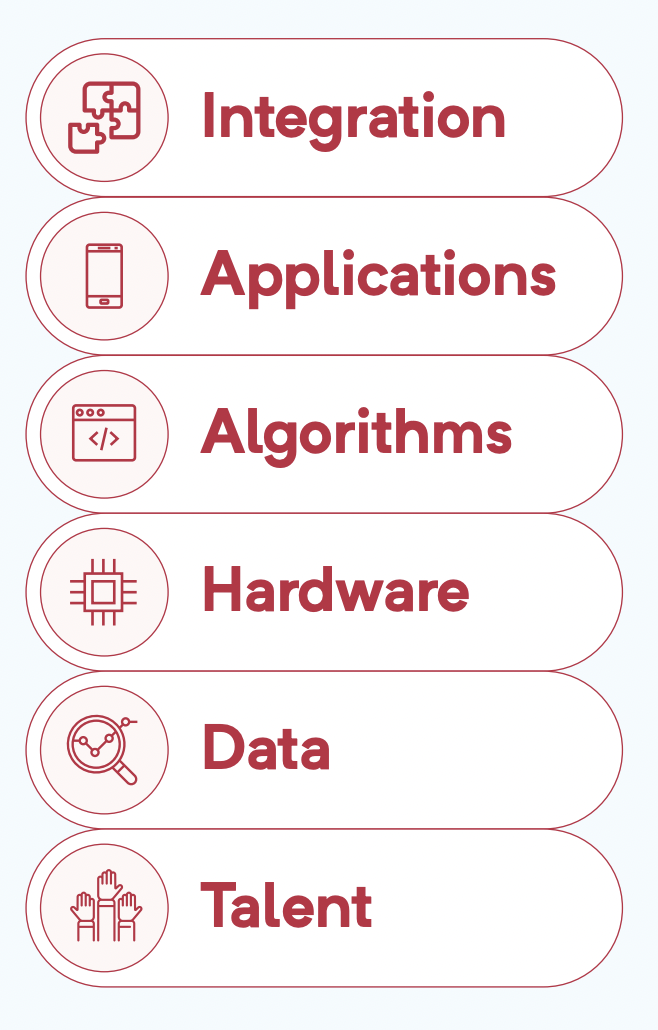
Robert Work during his days as deputy Defense secretary
WASHINGTON: The US has a narrow lead on China in artificial intelligence, but the Chinese are catching up fast. In fact, they’re already at least narrowly ahead in three of six critical areas, the vice-chair of the National Security Commission on AI said today.

The “AI Stack.” SOURCE: Final Report of the National Security Commission on Artificial Intelligence
“We do not believe China is ahead right now in AI” overall, Robert Work said, speaking at a Pentagon press conference alongside Lt. Gen. Mike Groen, the director of the Joint Artificial Intelligence Center. But, Work went on, “look, AI is not a single technology, it is a bundle of technologies” – what professionals in the field call the “AI stack.”
As Work and the commission’s final report explain it, the AI stack has six interdependent layers. The foundational layer is not technology but people who know what to do with it. The second most fundamental layer is data, the raw material machine learning must ingest en masse to evolve. Then there’s hardware, on which everything else runs; algorithms, the complex and ever-evolving equations that drive machine learning; applications, which apply algorithms to specific functions; and integration, which ties different applications together.
“We looked at each of the six and said, ‘where does the US have an advantage and where does China have an advantage?’” Work explained. “We judged that we’re ahead — slightly ahead or ahead – in three of the six, and China is ahead or slightly ahead in three to six”:
- “We believe the US has an advantage in talent right now,” he said. “We definitely are the global magnet for best talent. There’s a lot of things changing in that, and unless we’re smart about our immigration policies, etc. we can lose that, but right now we judge that we have better talent.”
- “We know we have an advantage in hardware — the United States and the West more broadly,” he said. However, if China ever took over Taiwan, peacefully or otherwise, the chip factories there would immediately give it the advantage in hardware.
- “We think we have an advantage in our algorithms, although the Chinese are really pushing hard,” he said. “We think that they can catch up with us within five to 10 years.”
- “Now, they have an advantage in our view, in data,” Work went on. “They have a lot of data, and they don’t have the restrictions on privacy etc. that we do.”
- “They have an advantage in applications. They’re very good at that,” he said. In particular, he explained, “China is a little bit ahead of the United States in fielding applications at scale. We can catch up with them, and we believe that JAIC is the logical place in the department to really be the accelerator.”
- Finally, “we think they have an advantage in integration, because they have a coherent strategy to get all of the AI stack together to give them a national advantage,” he said. “We have not organized ourselves to win the competition. We do not have a strategy to win the competition. We do not have the resources to implement a strategy, even if we had one.”
Now, not every layer of the stack is equal. China’s advantages are largely in the more visible upper levels of the stack, while America’s are in the more fundamental levels, making their impact less obvious and more long-term.
“Because talent, hardware, and algorithms are so central and important to the stack, we judge the United States, actually, is ahead of China in AI technologies more broadly,” Work said. “But … the Chinese are far more organized for a competition, and have a strategy to win the competition, and are putting in a lot of resources.”

Lt. Gen. Michael Groen
They’re also operating without the ethical constraints that bind the US and its allies, agreed Work and Lt. Gen. Groen. Selling military drones and surveillance software to authoritarian states, for example, are routine for China but deeply controversial in the United States. The willingness to exercise unscrupulous options both gives China an advantage in the competition and makes a Chinese-dominated world a problematic place to live in.
“The Chinese export autonomous systems to nations around the world, in you know, in some places that that have some pretty ugly conflicts that are underway, [with] lots of human suffering and not a lot of world attention in some cases,” Groen said. “So here you are you have a nation that’s proliferating autonomous systems with no ethical baseline, no sets of controls, no transparency.”
“What does that hold for the future… 2025 or 2030?” Groen went on. “We have to be prepared for that.”
“This is as much a values competition as it is a technological competition,” Work said.
Textron, Leonardo bank on M-346 global experience in looming race for Navy trainer
“The strength we think we bring is that [the Navy is] going to go from contract to actually starting to turn out students much quicker than any other competitors,” a Textron executive told Breaking Defense.



























